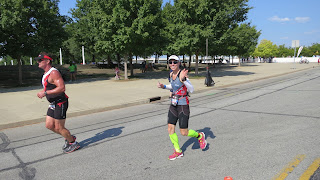Ironman training...it's a balancing act
 |
| This is how my morning rolls sometimes, running out the door with my 2nd or 3rd breakfast. |
Have you ever wondered what Ironman training entails or how
people do it? The day of 140.6 doesn't
sound so bad, but it’s the training that takes up the most time. I am happily married (4.5 years), no kids,
renting a condo in an urban area, working full-time (at a rehab hospital as a
student fulfilling my fieldwork clinical requirement) and these factors alone
make daily life challenging to balance. We
don’t have a lot of responsibilities and makes me wonder how people do it
working full-time as a parent AND their job AND as a triathlete! There’s
something called planning, time-management and prioritizing. The balance also requires dedication,
discipline and focus.
I’m in it to finish not to win a spot on the podium. At the same time, those of us that are in it
to finish don’t want to be at the bottom of the pack either. So, it requires us to listen to our bodies:
physiologically and physically. A spike
in the heart rate means slow down; muscle cramping often means electrolytes or
hydrate; musculoskeletal discomfort means readjust your stroke, pedal, and/or
steps. Pain, dizziness, heat exhaustion
often means…stop! Training is done on various levels that translate into XX
amount of hours in the week. Triathletes
can choose their own training plans whether it was free or they paid for it
with a coach. I chose my own free plan
online via Trifuel.com and often modify things according to my schedule. The important thing I keep in mind is to
listen to my body along the way. Another
tip I have learned from others is to not ‘freak’ out if you miss a training day(s). However, it’s a whole different story if
you’re training to qualify.
 |
| On July 13, I was simply happy to finish my 2nd Half-Ironman (Muncie 70.3) 19 minutes faster than my last half!! |
Here’s a glimpse of my current training schedule as an amateur
triathlete:
Monday: Off to
recover my muscles, take a mental break, or simply do something low impact such
as swimming for 30 min. I usually take a
full break.
Tuesday: Swim and
bike
Wednesday: Bike and run
Thursday: Swim and run
Friday:
Swimming…since I feel I’m a strong swimmer, I take this day to do
cross-training with low impact such as an elliptical for about an hour. Sometimes, I will replace running with the
elliptical during the week to give my joints a break.
Saturday: LONG rides (4-7 hours), if time I’ll squeeze
in a run or swim or I will have a race as part of my training.
Sunday: Sandwich
workout (run/bike/run)…lately I haven’t been able to do this on Sunday but
rather squeeze it in on a Wednesday since I’m traveling for races on the
weekends. For months I did LONG runs on
Sundays (about 2 hours).
 |
| My training buddies cheered for me as I rolled in after accomplishing my first 80-mile ride! |
What are the total hours by the end of the week? Somewhere
around 14-15. I’m supposed to be doing more
at this point in training, but sometimes my schedule doesn’t allow for more especially if I have a race or out of town on the weekends nor do I want to put additional stress on my body.
I do, however, get antsy and very anxious if I don’t keep up. Tuesdays-Thursdays are typically flexible
since I can switch it around based on how I feel, the weather, and social
things. I will train 2-3 hours during
those days.
Do we have a life?
Yes, but depends on who you ask. Since my clinical work hours are 7a-3:30p I
have time in the afternoons to squeeze in 2-3 hours and get home to be with my
husband. It’s hard being married and
training but my husband is VERY supportive and provides me with more than I
could ask for. Therefore, I make time
for this special man. Divorce is not
uncommon among triathletes because it does take two to tango. I do come home sometimes at 8-9p and have
time for dinner and bed. Rest is just as
important for recovery so I do go to bed early around 9-9:30p since I have to
get up at 5:30a for work. Needless to
say, I make an extra effort to spend a few date nights with my husband each
week especially the weekends that I’m home.
We love trying out new restaurants, going to baseball games and attending
local events. In addition, destination
races allow us to spend time together and relax together after the race.
 |
| My husband and I spending a Sunday night watching the Baptism festival at our Church. |
My friends (near and far) are also important to me. I, make an effort to call, text, or check in
with them. It’s hard sometimes
especially if there are exciting things going on. I am truly blessed to have such strong
support among my friends. Some of my
local friends even train with me although we may not be in the same race
together, end the end, we’re all pretty much training for half and full
Ironman.
Lastly, I’m not the person to go to for advice on training
and juggling parenthood, but I sure do admire those folks! I will often ask them how they do it and of
course it’s all about time management. I
think parents are often better at training because they are used to having so
much going on and balancing their lives.
I used to watch my dad running races and remember thinking it would be
so cool to be out there with him. There
were times I got to workout with him whether by feet or by bike. I LOVED being a daughter on the sidelines. In fact, if I were able to have a child
someday…I would love to inspire them as well.
My husband enjoys seeing the kids at the races supporting their parents
and running next to them at the finish, and I love seeing kids on the sidelines
holding up signs cheering for their mommy or daddy.
 |
| My daddy running his half marathon in Louisville, KY Kentucky Derby Festival Mini-Marathon |
 |
| 3 of his kids cheering for him on the sidelines |
Training for an Ironman is not too bad but it does make some
of us look forward to having other parts of our lives back after it’s
over. I have heard of post-Ironman
depression though. A lot of triathletes
will even take a vacation after the race.
Unfortunately, I’ll be going back to work day 2 after my first
Ironman. My clinical training involves
transferring patients…uh oh. I also know
that triathletes have weaker immune systems after an Ironman so it’s important
to recover well since they are at higher risk of getting sick. Some will even say avoid traveling a few days
after especially flying. Looks like I’ll
be stocking up on Emergen-C packs!
Bible verse of the day: "Teach us to number our days aright, that we may gain a heart of wisdom." ~ Psalm 90:12


Comments
Post a Comment